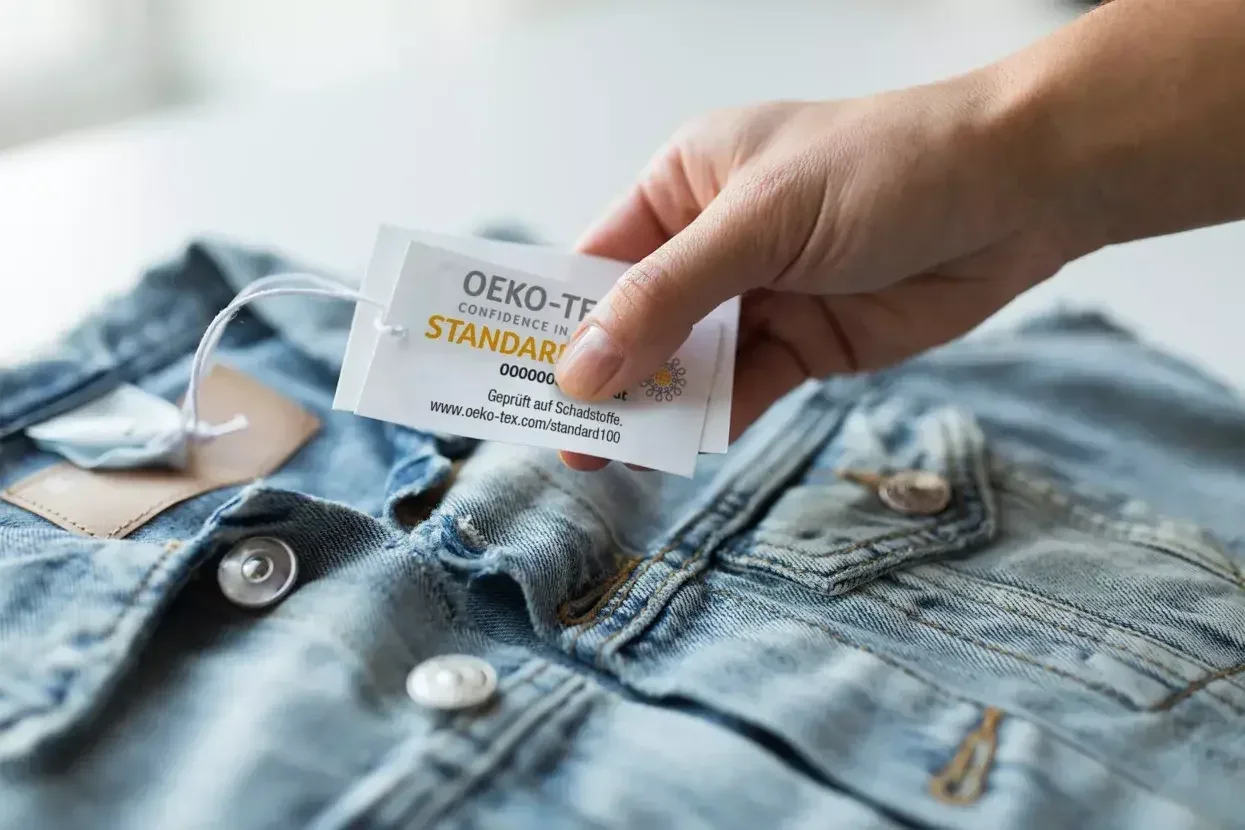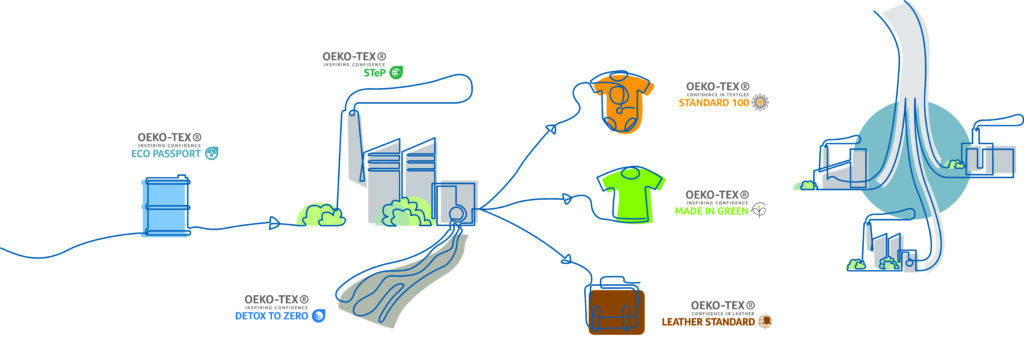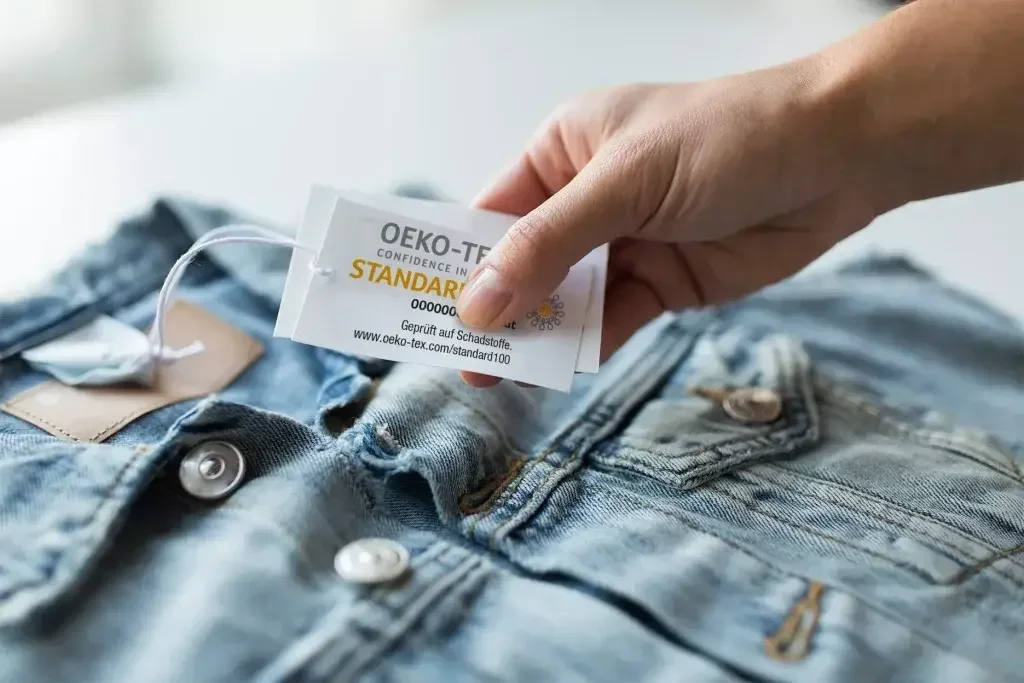
Textile testing specialist, Hohenstein emphasizes the importance of sustainable textile printing and for printers to have sustainable certification.
Mahatma Gandhi once said: “The future depends on what you do today.” This is a powerful message that particularly touches us as people around the globe and also commits us to sustainable action. For this, textile testing specialist Hohenstein was a founding member of the OEKO-TEX® Association, 30 years ago, and is the largest provider of certifications, labels and tools that enable companies to act sustainably by protecting people and our planet.
With more transparency into a more sustainable future
Companies and consumers around the world rely on the OEKO-TEX® brand. For three decades, OEKO-TEX® has stood for transparency along the international supply chains of the textile and leather industries, as well as for consumer protection, ensuring greater product responsibility and trust for all involved. Over 21,000 manufacturers, brands, and retailers in more than 100 countries officially work with OEKO-TEX®. With accredited testing and inspection services as well as broad industry and retail know-how, the textile testing specialist Hohenstein offers tailored solutions and supports companies along the textile value chain in matters of product stewardship and sustainable management. The OEKO-TEX® modular system provides the optimal basis for this as it continually refines its standards and is always practically orientated to current market requirements.

Caption: The OEKO-TEX® modular system provides the optimal basis for sustainable and socially responsible production of textiles and leather articles, as it continuously develops its standards and is always oriented towards current market requirements.
© Hohenstein
Input control
ECO PASSPORT by OEKO-TEX® is an independent certification for textile and leather chemicals, dyes, and auxiliaries. The three-stage verification process ensures that the substances fulfil specific requirements regarding sustainable production. ECO PASSPORT certified products are compliant with ZDHC MRSL to Level 1, 2 or 3. The certification assists manufacturers in the selection of chemicals that are environmentally friendly and harmless in terms of human ecology. They have reliable control over the substances used, right from their procurement, even before they feed them into their production process. The ECO PASSPORT certification of textile and leather auxiliaries is the perfect complement to the existing OEKO-TEX® certifications: On the one hand ECO PASSPORT integrates perfectly with the STANDARD 100 and LEATHER STANDARD by OEKO-TEX® (output control), on the other hand, it serves as proof of the use of sustainable chemical products for STeP by OEKO-TEX® certification (process control).

Caption: ECO PASSPORT certified products are compliant with ZDHC MRSL. The certification assists manufacturers in the selection of chemicals that are environmentally friendly and harmless in terms of human ecology. They have reliable control over the substances used, right from their procurement, even before they feed them into their production process.
© Hohenstein
Benefits at a glance:
1) Risk minimization
- You ensure that your textiles do not contain any harmful substances of the STANDARD 100 by OEKO-TEX® and LEATHER STANDARD by OEKO-TEX® RSL in concentrations that are harmful to humans.
- You may use all chemicals certified according to ECO PASSPORT to produce STANDARD 100 and LEATHER STANDARD certified articles
2) Cost saving
- For certification according to STANDARD 100 and LEATHER STANDARD, ECO PASSPORT is recognized as a pre-certificate. This saves you laboratory costs.
3) Traceability
- With an independent certification, you can demonstrate to your customers that you have a sustainable approach to sourcing and promote confidence in your products.
- A certification including self-assessment and audit is recognized by the ZDHC organization as “MRSL Conformance Indicator Level 3”, currently the highest level of compliance.
- Formulations certified according to ECO PASSPORT can be listed in the ZDHC Gateway – Chemical Module and in the OEKO-TEX® Buying Guide, so that manufacturers of clothing and footwear looking for sustainable chemicals can easily identify them.
Process control
STeP by OEKO-TEX® is an independent certification for environmentally friendly and socially responsible production facilites in the textile supply chain wanting to transparently document their sustainable commitment through an assessment, a company audit and a final scoring.
DETOX TO ZERO by OEKO-TEX® enables manufacturers along the textile supply chain to assess, on the basis of an annual status report, whether their chemical management and the quality of their waste water and sludge meet the objectives of the Greenpeace Detox campaign.
Output control
STANDARD 100 by OEKO-TEX® is an independent certification system for textiles from all stages of production that have been tested for harmful substances. The certificate is awarded when all elements of an item fulfil the necessary requirements, which are updated annually.
MADE IN GREEN by OEKO-TEX® is a product label for textiles and leather articles from materials tested for harmful substances that were manufactured in environmentally friendly facilities and under socially responsible working conditions. MADE IN GREEN makes it possible to trace labelled products transparently and learn more about their manufacture.
LEATHER STANDARD by OEKO-TEX® is an independent certification system for leather articles from all stages of production that have been tested for harmful substances. The certificate is awarded when all elements of an item fulfil the necessary requirements, which are updated annually.

Caption: As a founding member of the OEKO-TEX® Association, Hohenstein supports companies along the textile value chain in matters of product stewardship and sustainable management.
© Hohenstein
Hohenstein are sponsor of FESPA’s new feature, Sustainability Spotlight. FESPA’s Sustainability Spotlight show feature will provide useful, informative and actionable advice to address the needs of People, Planet and Profit. Guest speakers will present short insights into what’s going to affect you, how to avoid greenwash and what are the key priorities to meet brand’s needs. There will be a range of materials on display for graphic and textile printers to discover, accompanied by information to explain how they provide profitable solutions that customers will value. Finally, you’ll get to see the range of self-certification programmes and externally validated standards to aim for.
Visit this new feature at FESPA Global Print Expo 2022, Europe’s leading print and signage exhibition. Register now and use the code FESG201 to receive a 30 euros discount and pay only 50 euros for your registration.